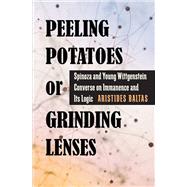
| Preface | p. xi |
| Note on References and List of Abbreviations | p. xvii |
| Coordinates of a Conversation | p. 1 |
| Mutual Introductions | p. 23 |
| Similarities and Affinities | p. 24 |
| Rigor | p. 26 |
| Method | p. 28 |
| Insight | p. 32 |
| Purposes and Ends | p. 40 |
| Activity and Purpose | p. 42 |
| Purpose and Responsibility | p. 46 |
| ... and the World | p. 48 |
| End | p. 49 |
| Eternity | p. 51 |
| Spinoza's Body | p. 55 |
| Life | p. 57 |
| Nothing | p. 59 |
| Silence | p. 61 |
| Grammar | p. 63 |
| Not My Purpose... | p. 63 |
| History and the History of Philosophy | p. 65 |
| The History of Philosophy and Philosophy | p. 66 |
| Philosophy and the History of Science | p. 68 |
| The History of Science, Language, and Philosophy Again | p. 71 |
| Grammar and Paradigm Change | p. 73 |
| From Grammar to Logic and Back | p. 77 |
| Teacher and Student | p. 80 |
| Wittgenstein's Body | p. 84 |
| Telling Nonsense | p. 86 |
| Strategies | p. 88 |
| Spinoza's Strategy; First Round | p. 88 |
| Wittgenstein's Position | p. 89 |
| Thinking of Strategy | p. 90 |
| My Strategy | p. 92 |
| The Strategy of the Tractatus: Opening Moves | p. 97 |
| Working from Within | p. 100 |
| The First Movement | p. 102 |
| Classifying Propositions | p. 107 |
| Performing Futility | p. 110 |
| Organizing Content | p. 113 |
| Plans | p. 114 |
| Structures | p. 121 |
| Beginnings | p. 125 |
| Matching Constraints | p. 130 |
| Metaphysics | p. 137 |
| Substance I | p. 139 |
| Spinoza's Grammar | p. 142 |
| Spinoza's Strategy: Second Round | p. 145 |
| Epistemologyl | p. 151 |
| Language | p. 155 |
| Substance II | p. 159 |
| Bodies | p. 165 |
| Afterlife | p. 168 |
| Substance III | p. 170 |
| Matching Content | p. 174 |
| Spinoza's Attributes | p. 174 |
| Psychoanalysis | p. 177 |
| Historical Materialism | p. 181 |
| Scientific Perspectives versus Logical Manifolds | p. 183 |
| Ideas versus Thoughts; Extended Modes versus Facts | p. 185 |
| Epistemology II | p. 188 |
| Matching Form | p. 194 |
| Possible Facts versus Possible Extended Modes | p. 194 |
| Natural Space versus Logical Space | p. 197 |
| Order and Connection versus Form and Structure | p. 200 |
| The Metaphysical Subject | p. 202 |
| Fractals | p. 204 |
| Natural History | p. 209 |
| Physics | p. 214 |
| Natural Necessity versus Logical Possibility | p. 219 |
| Logic in God, Logic of God | p. 225 |
| Exodus: Toward History and Its Surprises | p. 231 |
| Notes | p. 253 |
| References | p. 275 |
| Index | p. 285 |
| Table of Contents provided by Ingram. All Rights Reserved. |
The New copy of this book will include any supplemental materials advertised. Please check the title of the book to determine if it should include any access cards, study guides, lab manuals, CDs, etc.
The Used, Rental and eBook copies of this book are not guaranteed to include any supplemental materials. Typically, only the book itself is included. This is true even if the title states it includes any access cards, study guides, lab manuals, CDs, etc.